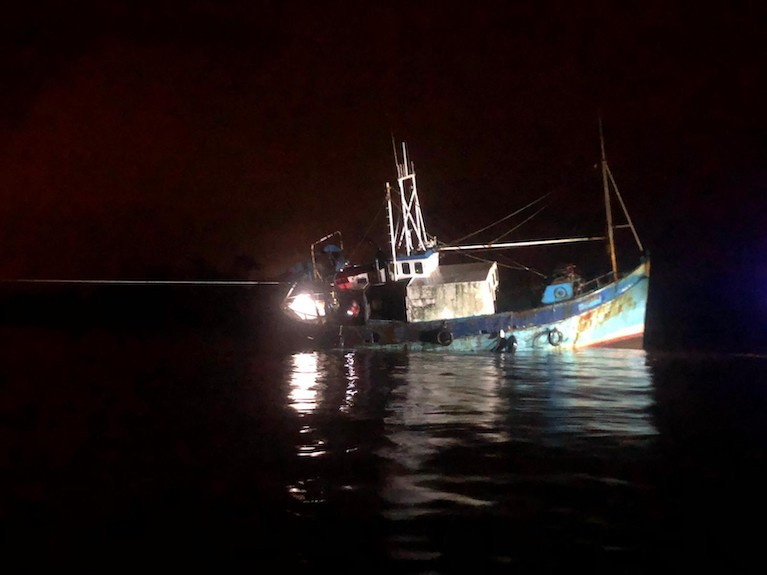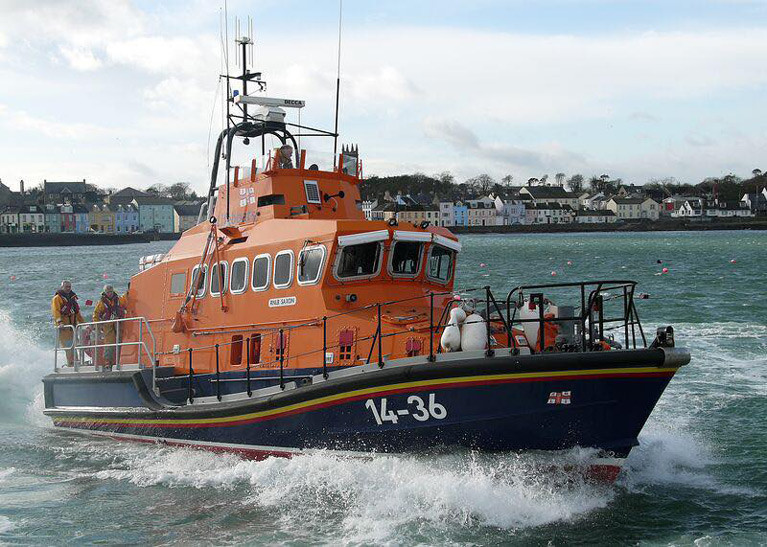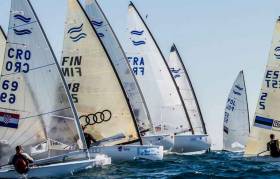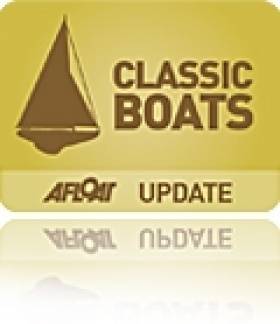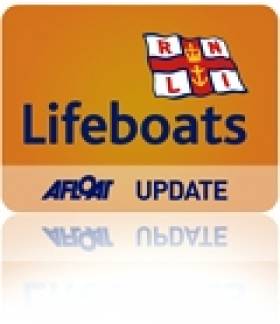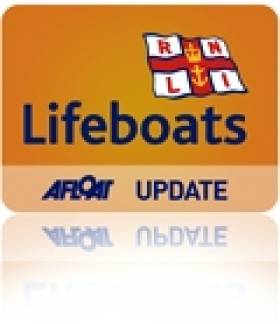Displaying items by tag: Donaghdee
Donaghdee RNLI Lifeboat Crew Rescues Fishing Trawler in Difficulty and 'Unsure of Location'
In the early hours of Thursday 25 April, the volunteer RNLI lifeboat crew from Donaghadee lifeboat station received a call from HM Coastguard to launch a rescue mission. A 40ft fishing trawler with one person onboard had contacted the Coastguard to report that they had no electrics, although they did have power and steering. The skipper was not confident of their location and thought they may be in Belfast Lough.
The Coastguard activated the pagers of the Donaghadee lifeboat crew to request them to launch. With a crew of seven onboard RNLI lifeboat Macquarie, the team was underway seven minutes later. The sea state was calm, and there was a light westerly wind, allowing them to make full speed in the general direction of the trawler's last reported location, just north of Portpatrick.
As the trawler had no electrics, it also had no navigation lights, leaving the boat with its skipper at risk of not being visible to a larger vessel at sea and restricting its own visibility. The Coastguard liaised with the crew on the lifeboat and reported an up-to-date rough latitude and longitude from the fishing trawler, enabling them to have a more accurate direction to take.
Iain Kaleda, mechanic onboard the lifeboat, was able to establish both phone contact and later VHF contact with the skipper. As the skipper had a handheld VHF onboard, this allowed the crew of the lifeboat to use their direction-finding equipment to gain a more exact location for the trawler.
At 3:15 a.m., the vessel was located approximately 18 miles north of Donaghadee. The crew established that the skipper was safe and well. It was agreed that, given that he still had no electrics, it was best that they escorted him to the safety of Bangor marina.
However, at approximately 5.30 am, the trawler lost engine power, and with still quite a way to go to the safety of the marina, and given the danger to both the vessel and other shipping in the area, the coxswain of the lifeboat decided that it was best to secure a towline to the fishing trawler and tow it with its skipper to safety.
After towing for about an hour, the lifeboat and the casualty vessel arrived at the safety of Bangor marina, where they were met by Bangor Coastguard Rescue Team and Bangor marina's local cat.
On Saturday, 29 April Donaghadee RNLI lifeboat volunteers were paged after a member of the public reported seeing a small fishing boat in difficulty off the coast at Millisle.
At 6.18 pm on Saturday evening, the crew were asked by HM Coastguard to launch the RNLI Trent class relief lifeboat Macquarie to go to the assistance of a 16ft red and white boat that had been reported as being in difficulty by a member of the public who had dialled 999. They reported that the boat appeared to have lost power and the person in the boat was trying to paddle ashore with a piece of wood.
In a light south westerly wind and a calm sea state the lifeboat made full speed despite the misty visibility and were on scene at 6.42 pm. They discovered the lone skipper had run aground on rocks just on the Donaghadee side of Millisle lagoon, and it was decided that the only way of assisting him was to launch the lifeboats daughter boat. With crew members Ross Bennett and Nicola Butler onboard, they were able to approach with caution and once alongside they established that the gentleman was not in any distress and that he had lost power to his vessel and drifted onto the rocks. They attached a tow rope and proceeded to tow the boat and skipper to Millisle slipway, where he was handed over to the Coastguard, where safety advice would have been given.
The lifeboat then proceeded to return to Donaghadee Harbour at full speed to be back on station and made ready for their next call out.
Donaghadee RNLI Comes to the Aid of Seven People onboard 18ft Boat that Breaks Down off Ballyhalbert
Donaghadee RNLI came to the aid of seven people onboard an 18ft Bayliner boat that broke down a mile off Ballyhalbert on the Ards Peninsula yesterday afternoon (Sunday 3 October).
The volunteer crew were requested by Belfast Coastguard to launch their all-weather relief Trent class lifeboat MacQuire at 12.30pm and assess the situation where the boat was reported to be drifting.
The lifeboat launched immediately under Coxswain John Ashwood.
Weather conditions at the time were sunny with partial cloud and a Force 4 north westerly breeze.
Arriving on scene, the lifeboat crew observed that all were safe and well and the boat’s crew had tied the vessel to a nearby lobster pot to prevent it from drifting any further.
Having assessed the situation, Coxswain John Ashwood decided to take six of the crew onboard the lifeboat while leaving the skipper on the vessel as the lifeboat prepared to tow it to the nearest safe port at Portavogie.
Speaking following the call out, Gerry Watts, Donaghadee RNLI Deputy Launching Authority said: ‘The crew onboard did the right thing in raising the alarm when they knew they were difficulty and they managed to prevent the vessel from drifting any further by tying it up when they could.
‘We would remind everyone planning a trip to sea to always respect the water. Always wear a lifejacket and always carry a means of communication. Always let someone on the shore know where you are going and when you are due back. Should you get into difficulty or see someone else in trouble, call 999 or 112 and ask for the Coastguard.’
Donaghadee Sailing Club on the north County Down coast heard the first gun fired in the Topper Northern Championships on Saturday 3rd July with a sense of relief and excitement.
Race Officer Aidan Pounder, Commodore of Ballyholme YC, assisted by Colin Loughead of Royal Ulster, sent the 37 competitors off for the first of three races on the first day, having waited for the breeze to fill in. The strong tide in the Sound off Donaghadee gave the sailors trouble resulting in general recalls, but all three races were completed successfully.
 The Topper Northern Championships get underway at Donaghdee Sailing Club
The Topper Northern Championships get underway at Donaghdee Sailing Club
Not like the following day when racing was abandoned in the early afternoon due to rolling fogbanks, so despite trying to run a fourth race which would have given a discard, three had to suffice.
For Rian Collins of Royal Cork, the long haul north was worthwhile for he lifted the overall first prize with Daniel Palmer of Ballyholme runner up.
 Rian Collins of RCYC (left) was the overall winner of the Topper Northerns pciturd here with Donaghedee Sailing Club Brian Lennox
Rian Collins of RCYC (left) was the overall winner of the Topper Northerns pciturd here with Donaghedee Sailing Club Brian Lennox
With prizes galore for the two divisions, the spoils were relatively well spread around the country.
Tyler Playfair of Carrickfergus won the 4.2s in Belfast Lough with Ballyholme's Hugo Boyd second. Ella Fitzgerald of National YC and Sutton Dinghy Club took the 5.3 prizes, followed by Eve McDonagh of Ballyholme. Junior Male went to Rian Collins, with Palmer runner up and
Junior Female to Autumn Halliday of Strangford Lough YC with Isobel Nixon of Ballyholme runner up. Toby Hughes (Royal North and Ballyholme) won Youth Male with Max Killiner also from Royal North second.
Brian Lennox, Commodore of Donaghadee SC, was delighted that the event could be held at his club; "I am delighted to see so many dinghies back in the Harbour after such a long break due to Covid. Thanks to all the volunteers who made this event a fantastic occasion".
Donaghadee RNLI Lifeboat Tow Broken Down Fishing Boat to Safety
The all-weather RNLI lifeboat from Donaghadee on the North Down coast launched at 3 am this morning (Tuesday18th) to the Belfast Coastguard's request to assist a 15m fishing boat with one person onboard. The boat, which was on passage from the fishing harbour of Ardglass on the south coast of Co Down, to Mallaig in Scotland, ran into mechanical difficulties in the early hours of this morning and drifted ashore at Templepatrick, just south of Ballyvester beach near Donaghadee.
The volunteer crew launched the RNLI Saxon at 3am and in flat calm sea conditions and driving rain made full speed and was on the scene in less than 10 minutes. As the vessel was so far inshore on a falling tide, the daughter inflatable lifeboat was launched and crew members John Ashwood, Deputy Coxswain, and Ross Bennett, crew member, made their way to the fishing boat to assess the situation.
It was decided that they should attempt a tow, but the attempt was unsuccessful due to the tidal conditions. After liaising with Belfast Coastguard and the fishing boat's skipper, the decision was made that the best plan would be for the lifeboat to return when the tide had risen. The lifeboat and crew returned to station at approximately 4.15am.
After a couple of hours' sleep, the crew relaunched at 8am and in similar conditions made their way back to the fishing boat at Templepatrick. They were able to go alongside as the tide had risen sufficiently and the same two crew members were transferred along with a salvage pump and towline. The tow was established while the salvage pump removed any excess water, and the boat was towed off the rocks stern first. The towrope was then transferred to the bow of the vessel, and an assessment was made to ensure there was no damage to the hull.
Saxon then proceeded a slow tow to Bangor in Belfast Lough, and while waiting for permission to enter the harbour, the lifeboat went alongside the vessel and transferred the lifeboat mechanic who was able to assess the mechanical difficulties and restart the fishing boat's engine. After discussions with the skipper and the coastguard, agreement was made that the vessel, now being under its own power, was able to proceed onwards to Mallaig.
Philip McNamara, Donaghadee RNLI Coxswain said: 'I would just like to thank our volunteer crew members for being so quick to come to the assistance of this fishing boat and of course their willingness to return again a few hours later and lose part of their days work. A thank you to their employers also, for their flexibility. We all wish the skipper and his boat safe onward passage to Scotland".
Donaghdee RNLI volunteer crew launched their all-weather lifeboat this afternoon at the request of UK Coastguard after reports of a person in the water following a jetski incident at Millisle, Co. Down.
At 1.45 pm UK Coastguard requested Donaghadee RNLI all-weather lifeboat launch after reports from a member of the public that a person had come off their jetski and was in the water approximately 200 yards from the lagoon in Millisle and being carried further out to sea.
Launching at 1.53 pm the volunteers of lifeboat Saxon, made full speed in slight sea conditions with a light northwesterly wind and excellent visibility. A local kayaker assisted the casualty while the lifeboat was en route. Two members of the public also attempted to swim out and assist but conditions prevented them from doing so.
Arriving on-scene at 2 pm with the inflatable daughter lifeboat at the ready, Saxon got as close as possible in shallow waters with close proximity to rocks, the crew attracted the attention of the kayaker who brought the casualty alongside the lifeboat where he was stabilised and brought onboard. He was assessed by a crew member and given casualty care as he was feeling the effects of the cold water. He was transferred to the care of the Northern Ireland Ambulance Service in Donaghadee Harbour. Air Ambulance was also on scene.
Philip McNamara, RNLI Coxswain at Donaghadee said ‘ We would not advise the public to attempt a rescue themselves in these situations as it puts them at risk also, the best thing you can do is always dial 999 and ask for the coastguard as quickly as possible. We extend our thanks to the kayaker who undoubtedly was instrumental in keeping the gentleman afloat while we were en-route. We cannot stress enough the importance of wearing a properly fitted lifejacket and suitable clothing when going out onto the sea – they can safe your life when the unexpected happens. We wish the gentleman a speedy recovery'.
A 28 and a 32 scored at the 53–boat Finn 2017 European Open Championships leave Ireland's Oisin McClleland from Donaghdee Sailing Club in 29th overall. The Northern Ireland solo sailor is competing at the Yachting Club de la Pointe Rouge, Marseille, France. The competition includes an Under–23 division.
Ed Wright from Great Britain opened the 2017 Championship with two emphatic race wins after a strong mistral kept the fleet on shore for most of the day. France's Jonathan Lobert was consistent with two fourth places to sit in second, while two fifth places for Anders Pedersen of Norway leaves him in third overnight.
After the practice race was abandoned yesterday, the mistral was still in place for the first full day of racing and though the early indication was that racing would start on time, this was soon rethought as gusts of 37 knots and a very steep sea was recorded on the race area. So the fleet sat on shore under AP under mid afternoon, when finally the wild wind abated slightly, but enough to get some racing underway, though the wind was still topping out at 30 knots.
Each race started with one general recall and then the black flag. The race was really one of two halves: in the starting area big waves and 25 knot winds; at the top mark, 10 knots, flat water and 60 degree shifts, with the windward mark set a few hundred metres of the high ground of L'ile de Pomegues.
The first race was initially led by class veteran Rob McMillan, now of Australia, who had a 30 second lead round the top mark. However his training partner, Wright, had taken the lead on the second upwind to extend down the reaches for his first win of the day, followed by Hungarian Zsombor Berecz and Ben Cornish of Great Britain.
The second race was much the same with the strong winds at the start line giving way to huge random shifts the further the fleet progressed up the course. This time Wright led all the way round, to win from Sweden's Max Salminen and the young Nenad Bugarin from Croatia.
The fleet finally came ashore after 19.00, exhausted, but happy after an awesome day of Finn sailing.
Racing in the opening series continues until Saturday, with the Semi-final and Final scheduled for Saturday afternoon.
Top ten after two races
1. Edward Wright, GBR, 2
2. Jonathan Lobert, FRA, 8
3. Anders Pedersen, NOR, 10
4. Max Salminen, SWE, 11
5. Ben Cornish, GBR, 11
6. Zsombor Berecz, HUN, 12
7. Milan Vujasinovic, CRO, 17
8. Oliver Tweddell, AUS, 19
9. Ioannis Mitakis, GRE, 21
10. Henry Wetherell, GBR, 21
A major fund-raising campaign will be launched (April 2, 2014) to save a famous lifeboat which rescued survivors from the Princess Victoria in 1953 and the Fastnet yacht race disaster in 1979. It's the second lifeboat with Irish connections to feature in a restoration project. Last month, Former Ballycotton RNLB lifeboat, Mary Stanford, made famous for a daring rescue of the Daunt Rock lightship crew in 1936, was hoisted out from Grand Canal Dock basin in Dublin and headed to her old east Cork homeport for a restoration project.
Now supporters plan to restore The Sir Samuel Kelly and build a maritime heritage centre around the vessel in Donaghadee where it was stationed for 25 years and crewed by local volunteers from the Royal National Lifeboat Institution – the charity that saves lives at sea.
Campaign spokesman, former lifeboat crewman, Ken Walsh, said: "The Sir Samuel Kelly is an important part of Ireland's maritime heritage and is on the UK's National Historic Ships register. Restored it will be a lasting memorial to the people who were lost in the Princess Victoria and Fastnet tragedies. It will also be a fitting tribute to the bravery of the RNLI crews who daily risk their lives to save others.
"With public support we believe we can raise the £500,000 needed to save this famous lifeboat and build her a fitting home in a town where she is cherished."
Donaghadee's Lifeboat Operations Manager, Alan Couser, said: "The RNLI fully supports this proposal which will highlight the role of our volunteers in saving lives at sea. I believe it will also prove an important tourist asset for the town."
A public meeting to launch the campaign will be held in Donaghadee community centre, Donaghadee harbour, at 7.30pm on April 2.
Editors' note: The Sir Samuel Kelly was named after a Belfast coal importer and philanthropist who died in 1937. It was built by J Samuel White & Co at Cowes on the Isle of Wight in 1950. The Watson class lifeboat was stationed at Donaghadee from 1951 until 1976 then was part of the RNLI reserve fleet at Courtmacsherry, Co Cork, until retirement in 1979. It was purchased by the Ulster Folk and Transport Museum and leased to the campaign group. An RNLI bravery medal and a British Empire Medal were awarded to the Kelly's coxswain Hugh Nelson for his role in saving 31 from the Princess Victoria in 1953.
RNLI Crews Assist Windsurfer, Stricken Fishing Boat in Co Down
#RNLI - Portaferry RNLI rescued a windsurfer who got into difficulty off the Co Down coast yesterday (16 April).
The volunteer crew launched their inshore lifeboat before 5pm yesterday evening to go the aid of the injured windsurfer reported to be in the area of Pig Island, a small island in Strangford Lough close to Newtownards Sailing Club.
The weather at the time was described as blowing slight to moderate winds with good visibility.
The crew was on scene at 5.15pm where they found the man on Pig Island accompanied by two other men. The windsurfer, who was suffering from a shoulder injury, was transferred to the lifeboat and made comfortable before being taken to the sailing club, where he was then transferred into the care of the coastguard and passed to the ambulance service to be taken to hospital.
Speaking after the rescue, Portaferry RNLI lifeboat operations manager Brian Bailie said: "As the charity that saves lives at sea, we will always respond to any call for help where someone is in danger.
"Strangford Lough is a popular destination for a wide range of water sport enthusiasts and it is important that they take all necessary precautions when using the lough.
"As we are all aware, accidents can and do happen and it is at such times that the work carried out by the volunteer crews of the RNLI is so important."
Elsewhere in Co Down yesterday, Bangor and Donaghadee RNLI assisted a fisherman whose 28ft commercial fishing boat experienced engine failure.
The crew quickly located the disabled boat one mile west of the Copeland Islands at the mouth of Belfast Lough yesterday morning after 11.15am.
With the vessel drifting closer to the island shores and the wind gusting gale force eight, a tow line was quickly rigged and passed to the fishing boat. Bangor RNLI was escorted by Donaghadee RNLI's all-weather lifeboat as it towed the fishing vessel to the safety of Bangor Harbour.
Bangor RNLI volunteer helm Peter Scott, who was involved in this rescue, said: "Engine failure close to shore could lead to a life threatening situation. We always urge everyone going to sea to make sure their electrical systems and engine are well maintained and in good working order. A good anchor and chain should always be carried as part of essential safety equipment.
"We are glad the skipper of this vessel is now safely ashore," he added.
Lifeboats Chief Visits Donaghadee, New Lifeboat for Arklow
#RNLI - Donaghadee lifeboat station was delighted yesterday (7 March) to welcome RNLI chief executive Paul Boissier, who was on a two-day visit to the Northern Ireland division.
Operational and fund raising volunteers crowded into the station to meet Boissier, who thanked them for coming out so early on a cold and wet morning.
While sitting enjoying the hospitality of the station, Boissier listened to the views of both crew and fundraisers on a wide range of topics. He said he was delighted to be in such a beautiful part of Northern Ireland and could not help but be impressed with the enthusiasm of all the volunteers.
He praised and thanked them for their commitment to the RNLI while remembering the support from the local community, and went on to say that the commitment of the operational volunteers supported by all at the station made the sea around the local coastline that much safer for everyone.
Meanwhile, Arklow RNLI was delighted to welcome the charity's newest lifeboat Kiwi and her volunteer crew to Arklow Harbour on Monday evening.
Prior to arriving in Arklow, the Tamar class lifeboat – which features the latest in search and rescue technology – had visited Torbay, St Mary’s on the Scilly Isles, Falmouth and Rosslare on her passage home to Wales. The weary crew arrived in Arklow after more than eight hours at sea.
The new vessel is a replacement station boat for Moelfre and replaces a Tyne class lifeboat similar to the one stationed at Arklow's flank RNLI station in Wicklow.
Kiwi was funded from a bequest by Reginald James Clark, a New Zealander who had been rescued by an RNLI lifeboat during World War II.
The crew from Moelfre was welcomed by Arklow RNLI's crew, fundraisers and station management along with members of the public.
Following her overnight stay in Arklow, she departed at 8.30am on Tuesday morning for her new home at Moelfre.



























